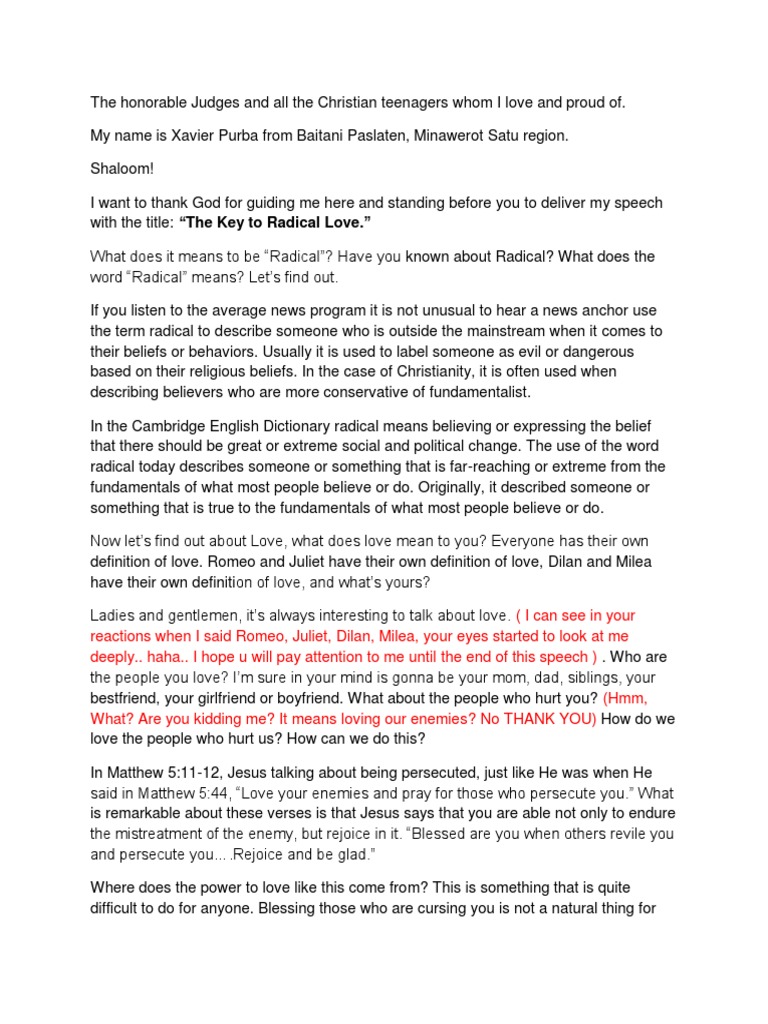The concept of radical love is profoundly interwoven within Bahá’í teachings, representing a transformative approach to interpersonal relations and societal interactions. This philosophy advocates for a drastic shift in perspective: from a paradigm of hatred and animosity to one characterized by love and understanding. In an era marked by discord, this tenet invites individuals to grasp the depth of compassion that transcends conventional practices of forgiveness and reconciliation.
At the core of Bahá’í belief lies the assertion that humanity must unite under the principle of love. This principle is not merely a superficial sentiment but encompasses the profound conviction that every person is imbued with the spirit of the Divine. Consequently, engaging with each other through the lens of love mandates a conscious effort to counter feelings of resentment and hostility with kindness and empathy.
Understanding the Bahá’í perspective on radical love necessitates delving into the inherent interconnections among all human beings. The Bahá’í Faith posits that humanity is akin to the diverse colors of a singular tapestry. Each individual, with unique attributes and experiences, contributes to the beauty of the whole. Embracing this notion encourages a profound appreciation of diversity, fostering a transcendent compassion that supersedes ephemeral differences.
As one embarks on the journey of embodying radical love, a pivotal realization emerges: the efficacy of love as a transformative force. Rather than allowing hatred to germinate and flourish, Bahá’í teachings advocate for preemptive love—extending compassion even in the face of animosity. This principle is articulated in the Bahá’í writings, asserting that “the best way to show love is to forgive.” Such forgiveness, however, is not passive acquiescence; rather, it demands an active re-evaluation of perspectives that leads to genuine understanding and rapport.
In contemplating the radical Bahá’í practice of love, one is beckoned to consider the broader implications on societal structures. The Bahá’í vision of a united world hinges on the collective engagement of individuals dedicated to love and service. When confronted with conflict, the Bahá’í individual is called to respond not with escalation, but with a conscious effort to diffuse tension through dialogue infused with compassion.
Moreover, the principle of radical love serves as a catalyst for personal transformation. Love nurtures the soil from which virtues can blossom—empathy, patience, and selflessness. These virtues, cultivated through daily practice, enrich one’s character and propel one toward a higher state of being. By consciously choosing to redirect feelings of hatred towards love, an individual commences a profound personal odyssey toward self-actualization, discovering that through this altruistic lens, one’s perspective on life becomes imbued with light and optimism.
An intriguing consequence of the Bahá’í practice of love is the ripple effect it generates. When love is given in the face of hatred, it not only transforms the giver but also disarms the recipient, creating a vermilion thread that binds them in mutual respect and understanding. This phenomenon is reinforced when we consider that the expression of love has the power to transcend cultural and linguistic barriers, fostering connections that may have otherwise remained severed.
The role of community in manifesting radical love cannot be overstated. Within the Bahá’í community, practices of collective action rooted in love and service illuminate a pathway toward societal betterment. Engaging in acts of service, compassion, and understanding fosters an environment conducive to healing and unity. The Bahá’í teachings underscore communal responsibility, urging adherents to actively participate in shaping a more just and equitable society. In this collective endeavor, love becomes a powerful agent of change.
As individuals increasingly encounter the polarization that pervades contemporary discourse, the Bahá’í call to radical love takes on renewed significance. This practice beckons adherents not only to espouse ideals but to exemplify them. It challenges each person to respond to provocation with compassion, to cultivate patience in the face of adversity, and to find common ground amidst the cacophony of opinions and beliefs that define contemporary society.
Ultimately, the radical practice of giving love for hatred invigorates the soul and reconstructs individual and collective identities. It engenders a paradigm shift wherein love is positioned as the prevailing force, capable of transmuting enmity into unity. The perseverance inherent in this philosophy ignites a spark of hope that inspires action, urging individuals to trailblaze pathways toward a brighter, more harmonious future.
In conclusion, the Bahá’í teachings embody an exquisite tapestry of principles promoting the radical practice of love. As humanity collectively endeavors to rise above hatred, the transformative potential of radical love paves the way for a more compassionate world. Engaging with these profound tenets enriches our understanding of interpersonal dynamics while fostering a lasting commitment to serve one another. Given the current global zeitgeist, embracing the radical Bahá’í practice of love is not merely idealistic; it is imperative for the collective evolution of society.
